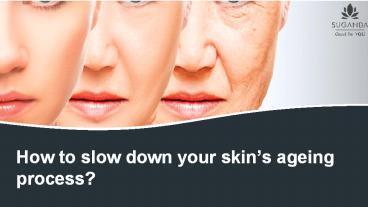How to slow down your skin’s ageing process? - PowerPoint PPT Presentation
Title:
How to slow down your skin’s ageing process?
Description:
Ageing is part of a natural human process that occurs in many organs, tissues, and cells throughout time and follows different paths. We can't see the signs of internal organ ageing, but the skin is the largest organ and we can see it ageing. To know more information Follow Us - Website - – PowerPoint PPT presentation
Number of Views:24
Title: How to slow down your skin’s ageing process?
1
How to slow down your skins ageing process?
2
- Ageing is part of a natural human process that
occurs in many organs, tissues, and cells
throughout time and follows different paths. We
can't see the signs of internal organ ageing, but
the skin is the largest organ and we can see it
ageing. - Ageing can be divided into two categories.
- 1. Chronological or intrinsic ageing
- 2. Extrinsic ageing
- Intrinsic ageing (chronological ageing)
- Chronological or intrinsic ageing refers to
ageing that is caused by our genes and is
influenced by time. It is a natural process that
everyone experiences. - Extrinsic ageing
- It is influenced by our lifestyle choices and the
environment we live in. External factors such as
ultraviolet light, cigarette smoking, and air
pollution can cause premature ageing. - One of the most important causes of extrinsic
ageing is exposure to the sun directly.
3
Photodamage Sun damage or photodamage causes
wrinkles and pigmentary changes in the skin at a
very young age. It can be avoided by avoiding
exposure to the sun for long durations or using
sunscreen to block or limit skin exposure to UV
radiation. Intrinsic or extrinsic ageing, a
skincare routine with anti-ageing ingredients
will slow down the ageing process. What
Anti-Ageing Products Should You Use? There are 2
main groups of ingredients used in anti-ageing
products- antioxidants and cell
regulators. Examples of antioxidants are vitamins
such as vitamin C, B3, and E. Their ability to
penetrate the skin makes them the most potent
antioxidants.
4
Benefits ? Powerful Anti Aging Set ? Reduces
the appearance of fine lines and wrinkles with
regular use ? Helps reduce sun damage ?
Diminishes the appearance of acne ? Resurface
new skin cells with accelerated cell turnover
5
Vitamin C As you get older, the levels of
collagen and elastin that keep your skin firm and
flexible drop. Collagen is the most common
protein in the human body and is essential for
skin and bone health. As we age, collagen
production decreases, leading to signs of ageing
like wrinkles and sagging skin.
6
The antioxidants in vitamin C may aid collagen
formation and the reduction of fine lines,
wrinkles, and scars. You can easily buy vitamin
C-containing skincare products or add a serum to
your daily moisturiser or lotion to make it
potent. There is another vitamin that you will
find in most skincare products, which is Vitamin
E. Clinical studies have proven that the
antioxidative protection is higher with the
combination of vitamins C and E than with vitamin
C or E alone 3 (in our article about vitamin C,
you may learn more about its benefits) The
other group of ingredients is cell regulators
such as retinol, polypeptides, and botanicals.
7
Using Retinoids Retinoids are one such substance
that inhibits collagenase (an enzyme that breaks
down collagen) synthesis and promotes collagen
creation. Retinol, also known as vitamin A and
other vitamin A derivatives, together comes under
the retinoids class. These are antioxidants that
particularly in combination with others, diminish
and neutralise free radicals. Retinoids, or
retinol, are converted into retinoic acid and are
used in cosmetics that are absorbed by the skin
easily. Suganda's 2 GRANACTIVE RETINOID IN
SQUALANE is an excellent example of one such
retinol serum.
8
AHA or BHA exfoliators Another important thing
you have to remember is to exfoliate your skin to
prevent early ageing. While traditional
exfoliants can be harsh on your skin, a leave-on,
ultra-gentle AHA or BHA exfoliant can help your
skin exfoliate organically and discreetly. Exfolia
nts containing alpha-hydroxy acids (AHAs) are
often used for anti-ageing, but they can also be
used for treating acne. For normal to dry skin,
AHAs work better than BHAs, as they are
moisturising. However, everyone who uses alpha
hydroxy acids should use a sunscreen that
protects against UV radiation, as AHA and BHA
make your skin more sensitive to UV rays.
9
Sunscreen Starting in your early 20s, you can use
sunscreen to prevent photodamage over time,
making your skin appear younger in the long run.
You can also start using sunscreen now if you
have not used one before and it helps you achieve
a visibly younger and more even skin tone. How
to choose a sunscreen? Broad-spectrum sunscreens
shield the skin against both ageing and damaging
UV radiation. There are 2 types of UV radiation
that affect the skin. One is UVA rays, which
cause premature ageing and skin cancer. On the
other hand, UVB rays cause sunburn and skin
cancer. As a result, it's critical to look for a
sunscreen that protects against both of these.
You can also opt for a moisturiser that is
enriched with ingredients and protects from both
UVA and UVB radiations.
10
What Are Some Other Skin Changes You May
Notice? Gravity, facial movement, and sleeping
position are all secondary factors that influence
skin changes. When the skin loses its elasticity,
it produces drooping of the eyebrows and eyelids,
looseness and fullness under the cheeks and jaw
(jowls and "double chin"), and bigger
earlobes. As we age, our skin changes. But keep
in mind that there are things you can do to aid
yourself. Keep an eye on your skin at all times.
Make lifestyle changes. If you notice any changes
that concern you, contact your doctor.
11
Thank You































